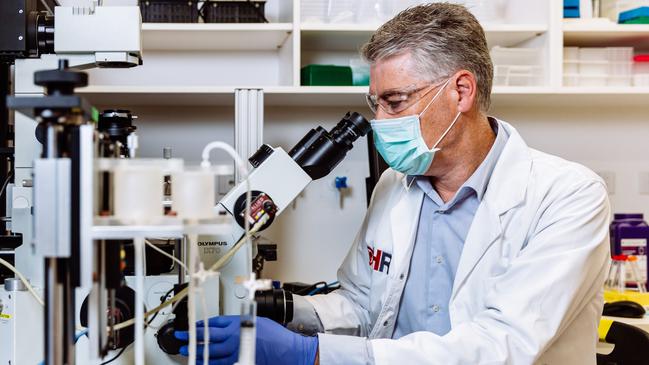Aussie tick spit breakthrough may be key to clot-busting stroke treatment
Australian researchers are using a protein found in tick saliva to develop a potentially lifesaving drug that dissolves blood clots to treat strokes.

Australian researchers are using a protein found in ticks to develop a potentially lifesaving drug that breaks down blood clots to treat strokes in what could herald the first major breakthrough in decades for treating the medical condition that is a leading cause of death.
The research found that a particular molecule in the common Australian bush tick’s saliva had blood thinning properties that could dissolve blood clots, which are responsible for 85 per cent of all strokes, affecting about 50,000 Australians a year.
Heart Research Institute scientists Shaun Jackson, Simone Schoenwaelder and Xuyu Liu, along with the University of Sydney’s Richard Payne, believe they’re on the cusp of developing a clot-busting drug that could provide vital treatment for patients following a clot-caused ischaemic stroke, which leads to brain damage by blocking blood flow.
“Ticks have a bad reputation,” Professor Payne said. “They carry parasites, but they do make really, really important bioactive molecules we can use for medicine.
“We’ve been modifying proteins found in the saliva of these ticks and we wanted to know what these modifications were doing to the activity of the protein – that’s never been done before.
“These proteins are really good anticoagulants that stop blood from clotting.”
Professor Jackson said the research was vital because there was just one other blood clot treatment, a drug called tPA, on the market to combat strokes. “Unfortunately, tPA helps less than 10 per cent of stroke patients and there is an urgent need to find new anticoagulant therapies to improve the clot-busting function of tPA.
“Anticoagulant agents we use in the clinic have been trialled with tPA, but they increase the risk of bleeds on the brain, which can be catastrophic.”
The team recently received a grant from the Targeted Translation Research Accelerator program to continue their research, that began five years ago when chemist Professor Payne made the discovery using a protein assay – a type of investigative procedure that measures the presence of a certain element.
“It’s always exciting when you discover something completely unexpectedly,” Professor Jackson says. “For me, that was a ‘wow’ moment.”
If the next phase of the research proves successful, the team will seek funding to move into human trials.
The Heart Research Institute is an internationally recognised medical research facility in Sydney that performs groundbreaking cardiovascular research.




To join the conversation, please log in. Don't have an account? Register
Join the conversation, you are commenting as Logout